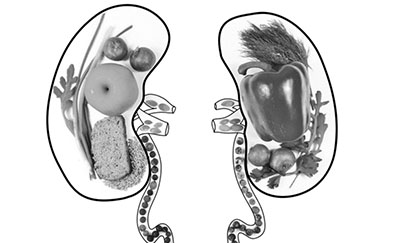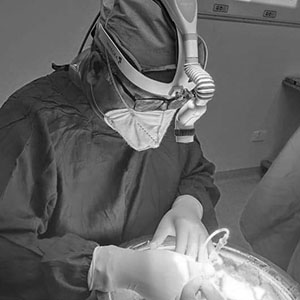Dietary Restrictions which patients may face pre-transplant do not apply in post-transplant period. Following transplantation, patients should follow a general healthy diet. He or she should limit the amount of fats in their diet because anti-rejection medications and the liberalized diet can cause elevated cholesterol levels. Patients also need to be careful of weight gain that may occur from anti-rejection medications especially prednisolone, as this causes dramatic increase in appetite.
Healthy Food- Diet includes a variety of foods, such as
- Fresh Seasonal Fruits & Vegetables
- Whole grain cereals and breads
- Low fat milk and dairy products
- Sources of calcium and phosphorous
- Sources of Plant Proteins
- Adequate Fluids
General Rules: Balance your Diet
- You are at the risk of developing diabetes (New onset diabetes after transplantation)
- You are not supposed to follow previously advised potassium/ phosphorous restricted diet, if your renal function is normal at discharge. But salt and trans-fat restricted diet still applies for you, as you are at risk of cardiovascular events.
- Fluid intake should match daily routine output, typically 3- 4 liters/day. In periods of excessive fluid loss like sweating, diarrhea, your fluid intake should be able to replenish the amount of fluid loss above the maintenance amount.
- Limit your carbohydrate /sugar (avoid refined starch) intake, as your immunosuppressant medications (Prednisolone, Tacrolimus) may cause an increase in weight and your blood sugar.
- Cereals and whole grains are rich sources of unrefined carbohydrates.
- Eat fresh seasonal fruits (Fruits should be peeled and washed off properly) and avoid juices as it is devoid of fiber.
- Eat meat products in moderation (Better to avoid).
- Avoid excess weight gain. Balance your diet.
To make your transplanted kidney live longer, follow these basic rules:
- Limit intake of salty foods having high sodium levels which will help limiting the fluid retention, saturated fats like butter, ghee etc to keep blood pressure and weight under control. A low fat and low sugar diet help keeping weight and blood sugar under control which indirectly helps transplanted kidney healthy Monitor your weight on a daily basis and eat a well-balanced diet with selections from all food groups.
- Avoid having high sugar snacks such as biscuits, chips, bhujia etc. in between the meals. If you feel hungry, eat some fresh seasonal peeled fruit or vegetables.
- Avoid cheese with mould and cheese made from unpasteurized milk.
- For a better bone health, take daily dose of 1000 mg to 1500 mg of calcium.
- A regular exercise like brisk walk, Yoga etc (30 minutes at least three times a week) will help control your weight.
- Try to drink at least 3-4 liters (9-12 glasses) of fluid every day. This is good for your kidney and helps remove waste products from your body. Always drink clean boiled or bottled water.

Following dietary instructions will help you achieve the above goals
Do’s
- Drink Lemon water (no salt & no sugar) , butter milk ( thin lassi without salt & sugar).
- In cooking oils, one can use Peanut, Sunflower, Corn, Mustard or Til oil.
- It is good to use 4-5 tsp of cooking oil per day.
- Eat whole dals like Sabut Chana, Sabut Moong, Sabut Masoor, Rajma, Lobia, Nutrinugget etc.
- Uses toned milk and prepare curd and paneer (cheese) from the toned milk. Milk and milk products contain good amount of calcium which is necessary to strengthen the bones which may get weaker by long term steroid intake.
- Eat sprouts (put sabut dal in muslin cloth & sprinkle water and keep it overnight, have it as a sprout chaat).
- Eat Chiwra , Upma or Poha ( add vegetables).
- Low sodium foods that can be taken when blood pressure persists : chiwra, onion, carrot, cauliflower, bottle gourd, karela , brinjal, beans, ladyfinger, methi dana, tomato, orange, amla, guava , papaya.
- Always eat fresh, clean and seasonal fruits and vegetables.
Don’ts
- Avoid sprinkling extra salt on food , salad etc.
- Avoid papad, pickles, chips, salted biscuits etc.
- Avoid having non vegetarian diet as much as possible especially Red Meat.
- Avoid aerated drinks, alcohol, packed juices, sugary drinks.
- Avoid all types of sauces likes tomato , chutneys, vinegar.
- Avoid ghee butter, coconut oil , dalda cream.
- Only the white of the egg should be eaten. Yolk should be removed.
- Avoid commercially available cakes & pasteries.
- Avoid having fried foods like parantha, kachori, puri, bhatura, samosas etc.
- Avoid cream biscuits, gur, jams, jelly honey, sweets (mithai), chocolates.
- Avoid cream milk.
- Avoid having high potassium and sugary fruits like mango, banana, chiku, grapes, dates etc.
- Do not Smoke.
Few important tips
- Drink plenty of water esp. before meals.
- Larger meal of the day should be breakfast and dinner should be light.
- Eat slowly.
- Have 1-2 small snacks in the mid morning and afternoon (fruit, unsalted nuts, sugar free jelly/pudding) yoghurt.
- Do not eat grapefruit or drink grapefruit juice (esp. for a patients on cyclosporine).
- Clean home cooked food for first three months post transplant (No outside food).
- Avoid raw vegetables and salad from outside.
- Avoid eating seafood, shellfish and beef in raw or half cooked form.
- Make sure to drink enough water. Avoid juices and sugary drinks to help keep blood sugar controlled.
- Avoid alcohol intake and smoking.
Get An Expert Consultation
* Kidney Transplant
* Robotic Kidney Transplant
* SWAP Kidney Transplant
* ABO Incompatible Transplant
* AV Fistula
* CAPD Cather Insertion
drvarunmittal@yahoo.com
